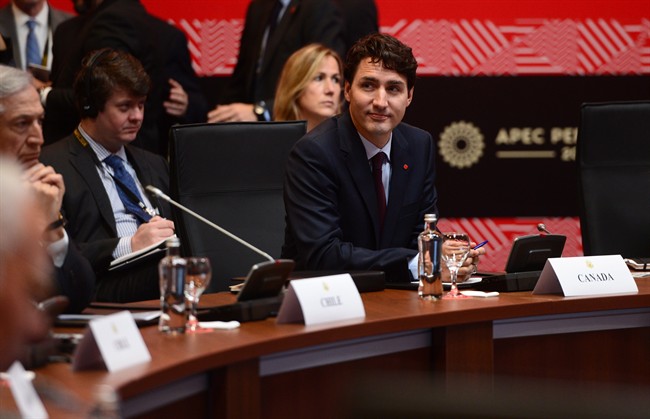Legislation to ratify the Comprehensive and Progressive Trans-Pacific Partnership will be introduced in Parliament within days and the move comes amid continuing concerns over whether it will be possible to reach a new NAFTA agreement.

The government gave notice on Wednesday that it intends to table the bill, which will implement the major trade deal signed in March by 11 other nations, not including the United States.
READ MORE: CPTPP legislation coming before the end of summer: Champagne
While that country had initially been among the parties negotiating the free-trade agreement, President Donald Trump backed out in 2017.
He called the deal “a disaster” at the time but then in April 2018, reportedly decided he wants back in.
READ MORE: Trump is calling backsies on exiting the Trans-Pacific Partnership trade deal
The full name of the bill will be An Act to Implement the Comprehensive and Progressive Agreement for Trans-Pacific Partnership between Canada, Australia, Brunei, Chile, Japan, Malaysia, Mexico, New Zealand, Peru, Singapore and Vietnam.
WATCH BELOW: Trans-Pacific Partnership: a backup plan if NAFTA fails

International Trade Minister François-Philippe Champagne had vowed earlier this month to table legislation to implement the bill before the House of Commons rises for the summer.
That is scheduled to take place on June 22.
The full text of the Comprehensive and Progressive Trans-Pacific Partnership (CPTPP) has already been presented in Parliament.
WATCH BELOW: Canada officially signs Trans-Pacific Partnership agreement

Parliamentary rules around the tabling of deals such as treaties state that governments must wait 21 sitting days after presenting the text of the agreement before tabling ratifying legislation.
That would suggest the soonest possible date for the bill to be introduced is June 19 — but there are exceptions to that rule.

Get breaking National news
According to the Global Affairs Canada website, “an exception to the treaty tabling process may be appropriate in certain cases, such as where a treaty’s ratification is urgently required.”
There is no clear definition of what would constitute ratification being “urgently required.”
READ MORE: Timeline of Donald Trump’s war of words (and trade) with Justin Trudeau
- Carney unveils ‘Buy Canadian’ defence plan, says security can’t be a ‘hostage’
- Rhode Island shooter killed ex-wife, son before bystanders intervened: police
- Canadian immigration officers investigating hundreds identified by extortion task force
- ‘Canada can broker a bridge,’ Carney says on new trading bloc efforts
In order for that to be determined, Foreign Affairs Minister Chrystia Freeland and Champagne would need to submit a joint letter to Prime Minister Justin Trudeau laying out their rationale for a more speedy ratification and asking for approval.
That letter would not need to be tabled in the House of Commons.
The CPTPP has been billed as a sort of bulwark against some of the uncertainty stemming from escalating tensions and uncertainty over trade with the United States, which has indicated it plans to consider further tariffs and protective measures on top of those already fraying the relationship with Canada.
READ MORE: Chances that Trump will impose auto tariffs ‘reasonably good:’ U.S. trade expert
Over the weekend, Trump launched a tirade of threats against Canada over a perceived snub by Trudeau during the latter’s closing statements at the G7 summit.
Trump, who left the summit early to head to Singapore for a meeting with North Korean dictator Kim Jong Un, accused Trudeau of making “false statements” in his closing press conference when he pushed back hard at Trump’s assertions that there would be a sunset clause in the renegotiated NAFTA agreement.
WATCH BELOW: Trudeau gains support following Trump post-G7 tweets

Trump also called Trudeau “weak” and then said he had instructed his officials not to endorse the joint communique issued from the leaders at the summit.
His economic adviser, Larry Kudlow, later told CNN that Trudeau “stabbed us in the back.”
Peter Navarro, Trump’s trade adviser went one step further, saying that there’s a “special place in hell” for Trudeau, but later apologized.
WATCH BELOW: How will the Trudeau-Trump fallout affect NAFTA negotiations?

The feud comes amid a sharp escalation in tensions between the American administration and Canadian officials over trade.
Trump imposed harsh new tariffs on Canadian steel and aluminum, and threatened earlier this week to impose tariffs on auto parts as well.
Canada, in response to the steel tariffs, announced $16.6 billion worth of retaliatory tariffs set to go into effect on July 1.
WATCH BELOW: #ThanksCanada: Americans pay tribute to Canada amid Trump attacks on Trudeau

Trump has billed the use of tariffs as a negotiating tactic in NAFTA talks while Canadian officials have insisted they view the matters as entirely separate.
NAFTA talks, however, appear to have stalled in recent weeks amid those tensions.
Freeland returned to Washington on Wednesday for efforts to restart those talks.
She will also accept the Diplomat of the Year award from Foreign Policy magazine for her work on the file.








Comments
Want to discuss? Please read our Commenting Policy first.